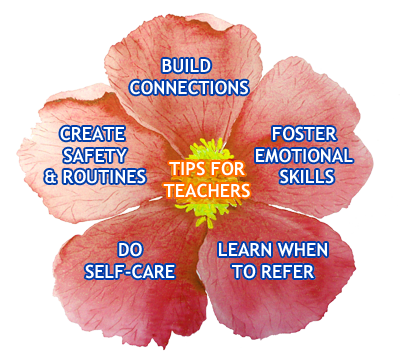Tips for Teachers is a collection of ideas and advice from teachers who have lengthy experience working with students of refugee backgrounds. The teachers were asked questions related to social and emotional supports.
The questions reflect best-practice in working with students who have experienced traumatic stress.

Create Safety and Routines: Creating a classroom that feels safe is essential for students who have experienced trauma. Routines are the easiest way to communicate safety. Routines offer the opportunity to know what will happen next, and to relax in the feeling of being safe now. Practical ideas
Build Connections: Building safe connections for students with refugee backgrounds is foundational to students’ success in the classroom and in the school system. Practical ideas
Foster Emotional Skill Development: Learning to manage emotions is part of normal development. Students whose normal development has been interrupted may not have had the chance to learn how to manage intense feelings. Basic emotional skill development includes naming feelings, expressing feelings appropriately, changing the intensity of feelings (i.e., stronger feeling, less intense feeling, no feeling or switched to another feeling). Practical ideas
Do Self Care: Working with students with refugee backgrounds exposes teachers and other professionals to very difficult situations and heart-wrenching first-hand stories. This material can be challenging to process, and can erode an adult’s fundamental sense of safety and well-being. Self-care is key to remaining healthy in work with students with histories of loss, grief, stress and trauma. Practical ideas
Learn When to Refer: Teachers are often the first to refer students for counselling or additional support. Teachers are consistent adults who see a student’s emotional and mental states over time. Students with refugee backgrounds are often at-risk for mental health issues, and teachers can be key to timely interventions. Practical ideas



